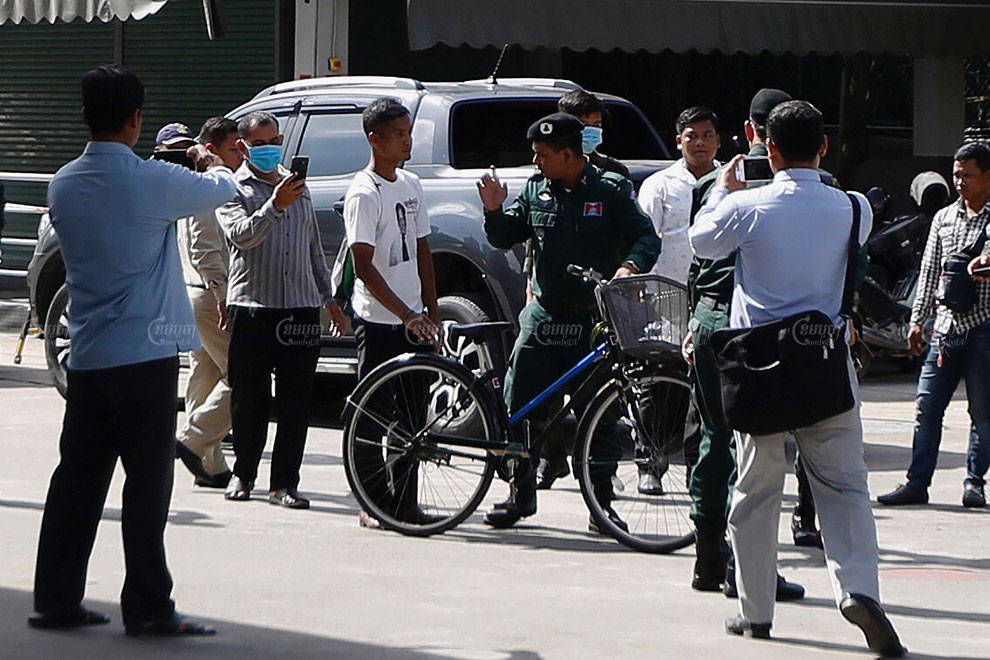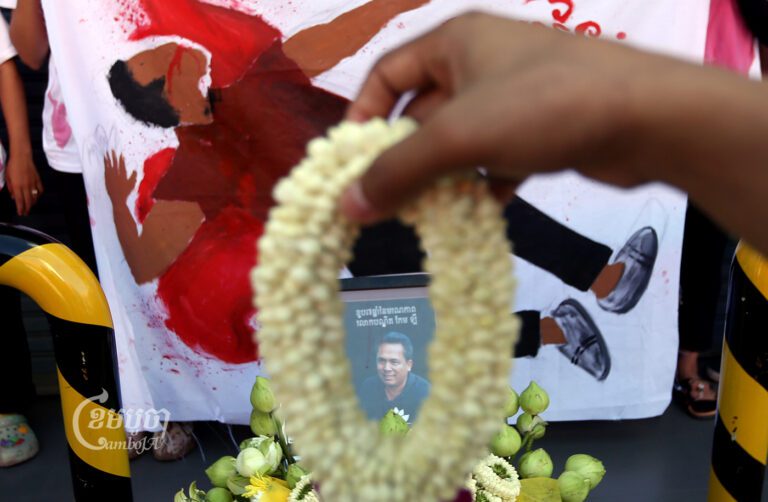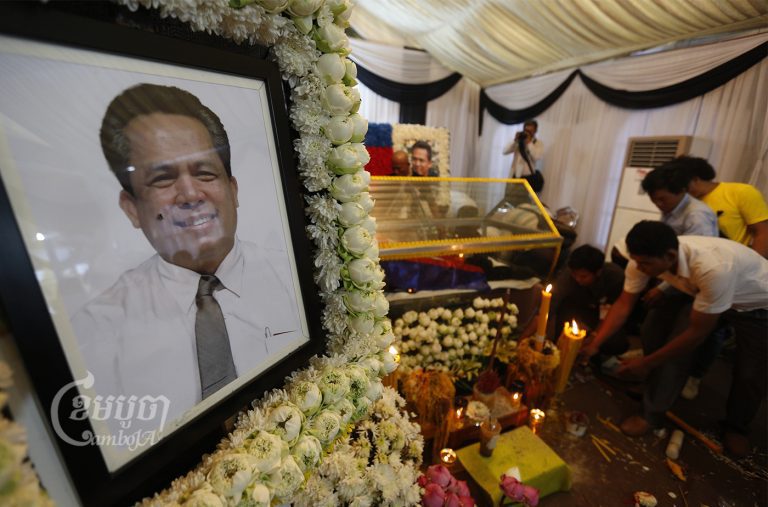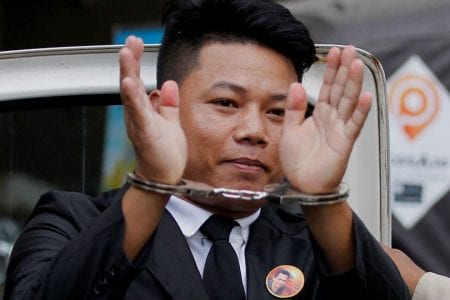Chamkar Mon district police officials and security guards on July 8 prevented youth activists and monks from marching and detained a man wearing a T-shirt with Kem Ley’s image during a gathering to commemorate the anniversary of the death of the prominent analyst who was killed on July 10, 2016.
Civil society groups said the decision to block the demonstration was another example of Cambodia’s ongoing restrictions of freedom of assembly.
Some 50 police officers and security guards were deployed to prevent a group of seven activists and 12 monks from entering the Caltex gas station minimart in Phnom Penh where popular government critic Kem Ley was shot to death nearly four years ago.
Police said one man was briefly detained for questioning for wearing a T-shirt featuring an image of Kem Ley alongside text reading “Wipe your tears and continue your journey.”
Hong Chantheng, Boeng Trabek commune police chief, said Kann Chanthorn was questioned for an hour, educated on his offence, then allowed to return home.
“We are not detaining him, we just brought him to ask information about why he was wearing the T-shirt [of Kem Ley]” he said. He added that the police’s actions were meant to maintain public order, and that the gas station owner had requested that police stop the group from holding a ceremony, saying it would have a negative effect on business.
“Phnom Penh administration does not allow this because we have Freedom Park for people who want to hold a ceremony,” Chantheng said when asked if preventing the ceremony was a restriction of the freedom of assembly. “We just followed an order from the top leaders,” he added.
Chanthorn, 34, said that he was disappointed that he had been questioned and detained amid a peaceful demonstration.
“He [the police officer] asked me ‘Where are you from? Did somebody hire you to come here?’”
Chanthorn said he told police that no one had forced him to attend the event, and that he had decided to join after hearing about it on Radio Free Asia.
“I think that it is restricting peoples’ rights and suppressing assembly,” Chanthorn said, adding that police had seized his T-shirt featuring Kem Ley. “I am just a common person and I was wearing a T-shirt of Dr. Kem Ley and to express my love of him.”
Hun Vannak, 35, an environmental activist who also attempted to join the ceremony but was forced to leave the gas station compound by plainclothes officers said on July 8 that celebrating a traditional religious ceremony, such as the anniversary of a death, is the right of every citizen.
“I am Khmer, why can’t I stand here?” Vannak said to an official who was pushing him away from the convenience store entrance.
“I just came to drink coffee normally and to commemorate the fourth anniversary of the death of Dr. Kem Ley,” Vannak said after leaving the area.
“He was a hero who had sacrificed himself for the betterment of our society and nation,” he added.
One district security guard yelled at the group of youths and monks that “No Buddhist ceremonies here, please go away!”
Phnom Penh City Hall spokesman Met Measpheakdey said authorities had correctly implemented the law by blocking the protest in order to maintain public safety.
“It is a learning process for people, especially for young people who feel they need to exercise their rights,” and don’t like “not doing what they want,” he said.
“We do everything to follow the law,” he added. “Plus, it is a private place and the owner had requested the authorities curb the protest in case anything risky happened.”
Venerable Bou Bet, who also attended the gathering, said he had joined to offer a blessing for Kem Ley and his family, who are still seeking justice.
“I think that it is restricting our rights as citizens who want to help others,” Venerable Bet said, adding that he considered Kem Ley a hero for helping educate people on social issues in Cambodia.
Soeng Senkaruna, a senior investigator at rights group Adhoc, said that freedom of expression is on the decline even as Cambodia is under pressure from the international community over its human rights record.
He said that the right to assemble was guaranteed in Cambodia’s Constitution, and that people in democratic nations should be allowed to express their opinions freely, including through their clothing.
“It isn’t wrong that he was just wearing that T-shirt,” Senkaruna said.
“Cambodia has not yet opened the space to allow the right of assembly and to exercise freedom of expression,” he added.
Chak Sopheap, executive director at the Cambodian Center for Human Rights, said via email that the government must respect the fundamental freedoms of those who wish to commemorate Kem Ley’s death.
“These rights are a cornerstone of democracy and [are] enshrined in both our domestic law and international human rights law, and they cannot be restricted unless strictly necessary and in pursuit of a legitimate goal,” she said.
Sopheap said that in respecting these rights, the government must cease its harassment and intimidation of those commemorating Kem Ley’s death.
She added that the lack of a transparent investigation into Kem Ley’s death had left his family without justice.
“It is crucial that the government conducts an independent and impartial inquiry into his death, and I urge them to take the opportunity of the fourth anniversary of his death to do so,” she said.
Environmental activist Vannak said that a group of youths had organized a new event to mark Kem Ley’s death, and would be marching from Phnom Penh to Kem Ley’s hometown in Takeo province on July 9.











